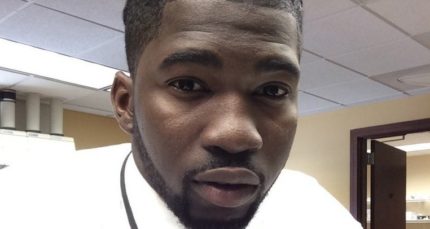When 22-year-old artist and college student Mathew Ajibade was in the throes of a manic episode from bipolar disorder on New Year’s day on the streets of Savannah, Georgia, his fiancee decided he needed to be at a hospital because he had begun to strike out at her. So the fiancee, Fisayo Odewole, called 911 for an ambulance.
But instead of an ambulance, the dispatcher sent the police to her, which began a series of events that left her husband-to-be dead in a Chatham County jail cell a few hours later, with no explanation of what killed him.
Mark O’Mara, the attorney hired by the Ajibade family, is pushing to view the video footage from the newly renovated Chatham County Detention Center, which his office says is equipped with multiple cameras “all over the place.”
O’Mara, the lawyer who successfully defended George Zimmerman at trial for killing Trayvon Martin in Florida, said that considering the public’s anger over the recent deaths of Black males under questionable circumstances, he is calling on the authorities in Savannah and Chatham County to be as transparent as possible about what happened to Ajibade when he was taken by police to the detention center.
“A guy who was bipolar dies in a restraining chair,” O’Mara said in an interview with Atlanta Blackstar. “You don’t die from bipolar disorder. They need to get a cohesive explanation out as soon as possible. Not only does the family deserve it, the public does. There are a lot of Black males being killed in circumstances that don’t make much sense.”
O’Mara said the fiancee was “truly in shock” after the incident.
“The fiancee was calling for help, then you lose him?” he said.
Odewole told O’Mara that when the police arrived on the Savannah street where she was tending to Ajibade, she objected when she realized the police were charging him with domestic violence and battery after they saw the injury to her face. They added obstruction to the charges when he began resisting them.
“Fisayo says she told the police about Mathew’s condition and asked them to take him to the hospital,” O’Mara explained in a position statement. “She gave officers Mathew’s medication, and she even called Mathew’s employer, who understood Matthew’s condition, so they could further vouch for Mathew and document his condition.
“Fisayo said that the officers promised to take care of Mathew, but instead, many hours later, they showed up at her door to explain that Mathew ‘had died.'”
The Chathan County Sheriff’s Office issued a press release explaining that while being restrained, Ajibade injured three officers, with one officer suffering a concussion and a broken nose.
“The inmate was placed in an isolation cell due to his dangerous behavior,” the press release said. “Upon the inmates second welfare check the inmate appeared non responsive. The Medical Unit staff started CPR and administered defibrillation while preparing the subject for transport to Memorial Medical Center. Efforts to resuscitate the inmate Matthew Ajibade were unsuccessful.”
“We don’t know the cause of Mathew’s death,” O’Mara said in his statement. “The Georgia Bureau of Investigation conducted an autopsy on January 6th, and we expect to get an answer as soon as possible. But even if we discover the cause of Mathew’s death, the autopsy won’t necessarily tell us why Mathew died. Why wasn’t he taken to the hospital? Did officers take into account Mathew’s mental illness? How was he allowed to die while in officer’s care? You are not supposed to die from bipolar disorder.”
O’Mara said Ajibade’s death raises two troubling questions: How the police deal with people of color and how they contend with people with mental illness.
“In the wake of Michael Brown and Eric Garner, there is a crisis of confidence in our criminal justice system,” O’Mara said. “There is an opportunity now for leaders in Savannah, Georgia to show the nation how to properly deal with this type of tragedy. We and the rest of the nation is watching.”
O’Mara’s office said Georgia officials are still awaiting Ajibade’s toxicology results before they will release the results of his Jan. 6 autopsy.
Ajibade’s family is holding a private funeral for him tomorrow. They are planning a memorial service for the popular artist in early March so that his friends and fans in Savannah can come together to celebrate his life and his work. To raise money to transport some of his family members to the memorial, they are selling t-shirts designed by Ajibade at the website, booster.com/justiceformatt.
Ajibade was born in Lagos, Nigeria, and raised in the Washington, D.C. area. He was an artist, photographer, and designer who was studying at the prestigious Savannah College of Art and Design and AD.
His family and friends describe him in the following way on the fundraising website: “He was a selfless person who stopped at nothing to help everyone. His contagious charisma and charm always kept his friends and family going. He was a creative genius in his own right, full of life, and always working on something new. Matt had a lot of life left to live and he will not get the chance to.”



